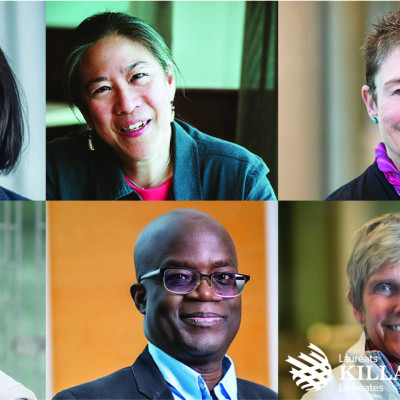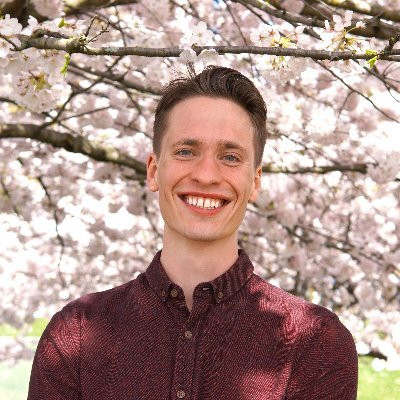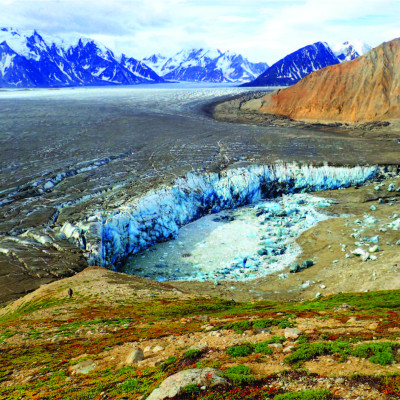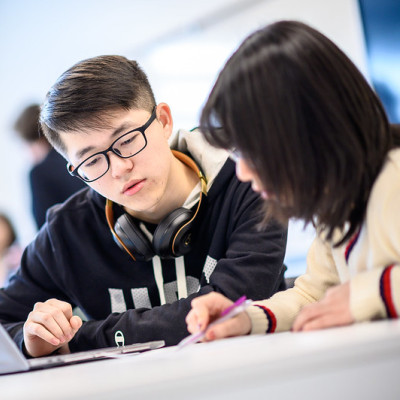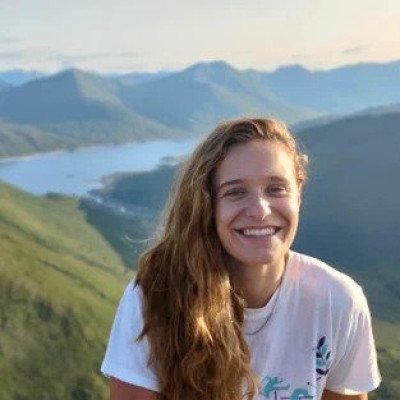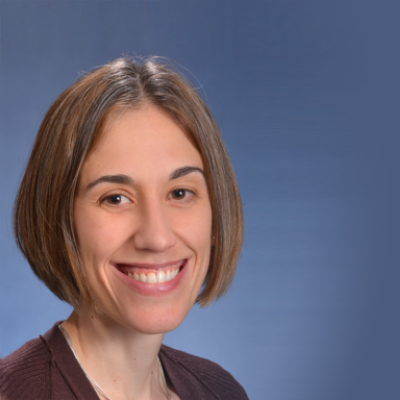News
Stay up-to-date with what's happening in EOAS
Research horizons: What now, what next? An evening with UBC's newest Unviersity Killam Professors
EOAS' Professor Dominique Weis is one of UBC's six newest University Killam Professors speaking at the upcoming panel Research horizons: What now, what next? An evening with UBC's newest University Killam Professors. on Monday, May 2nd from 6:30 onward at the Robert H. Lee Alumni Center. Professor Weis is a renowned leader in the application of trace elements and radiogenic isotopes analysis. Her analytical insight has enabled new discoveries into Earth systems such as mantle plumes and hotspot volcanoes. Through the analysis of a wide range of materials such as honey, salmon, or belongings, her expertise allows the opening of new lines of research into health/epidemiology, local pollution/food security, and archeology/Indigenous-led studies. Professor Weis is a Canada Research Chair (Tier I) in the Geochemistry of the Earth’s mantle, a Fellow of the Royal Society of Canada, of the Geochemical Society and the American Geophysical Union.
Geochemistry helps us understand how the Earth formed and how it works. We can also use geochemistry directly to help in the discovery of mineral resources, in keeping the planet habitable and in assessing how clean our cities are. The potential applications of these tools over the last century have been highly dependent on the development of analytical techniques. These techniques helped us to determine an absolute age for the Earth as recently as 1956. Nowadays, Uranium-Lead dating means we can determine the age of objects and materials with astonishing precision, while using ever-smaller samples–as little as a nanogram. In this presentation, Professor Weis will share recent game-changing applications of geochemistry, looking at volcanoes, environmental biomonitoring, archaeology and anthropology.
The event is free, but has limited space. Reserve your spot by booking a ticket here.
Meet Sam Anderson - Geophysicist
Sam Anderson is a PhD candidate in geophysics working with Dr. Valentina Radic at the University of British Columbia. He is curious about the relationships between ice, water, and people. His research seeks to understand how community-scale water supplies in Western Canada will be shaped by climate change through experiences such as the loss of glaciers and heat waves, and he is interested in applying data science techniques such as deep machine learning to investigate environmental problems. Before his graduate work at UBC, Sam did his undergraduate degree at the University of Alberta, obtaining a BSc in Engineering Physics and specializing in nanoelectronic engineering.
Sounds of Earth: A Musical Exploration of our Dynamic Planet
To celebrate Earth Day, the Department of Earth, Ocean and Atmospheric Sciences joined forces with the School of Music to present a collaborative concert in which student composers worked with Earth science students and faculty to explore the some of the most powerful phenomena on Earth. Join us Tuesday April 19 at 7:30 pm in the Telus Studio Theatre. For more information on the program, visit the Chan Center webpage.
New interactive teaching and learning resources to explore climate and Earth science concepts
How can students be inspired and motivated to interactively explore complex concepts? The introduction of lightweight, focused, interactive learning apps or dashboards is part of the larger TLEF funded OCESE (Opensource Computing for Earth Science Education) project in EOAS.
Online simulations and datasets are not new, so what’s special about our dashboard learning apps? The answer is that they are designed to enable immediate exploration of a tightly focused concept and/or dataset. Some bring to life complex ideas, such as modeling the factors affecting global temperature, while others enable students to address meaningful problems by exploring and interpreting carefully curated existing data sets. Built largely by students and coded in Python, such dashboards can:
- Fill the gap between older paper-based resources and current feature-rich, or experts-only datasets and software tools;
- Enable un-guided or guided exploratory engagement with concepts or data;
- Complement a course’s rigorous treatment of a subject by enabling students to gain intuition through exploration of suitable simulations and datasets;
- Allow students at any level to focus on the problem or concept without the distraction of complicated new tools or larger-than-necessary data sets.
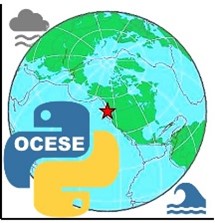 Over ten dashboards have been completed or are in progress. All are described briefly at our project website’s dashboard page. They are licensed for open use, and all will become formal, searchable UBC Open Education Resources (OERs). Find details on our one page project outline, or the emerging project website. Below are some snapshots of the dashboards and you can click on the link in the title or the snapshot to interact.
Over ten dashboards have been completed or are in progress. All are described briefly at our project website’s dashboard page. They are licensed for open use, and all will become formal, searchable UBC Open Education Resources (OERs). Find details on our one page project outline, or the emerging project website. Below are some snapshots of the dashboards and you can click on the link in the title or the snapshot to interact.
Two examples of process models or simulations for exploring concepts
1. Factors affecting global temperature: Contributions of several natural and anthropogenic factors to the global temperature anomaly are plotted for 1880-2005.
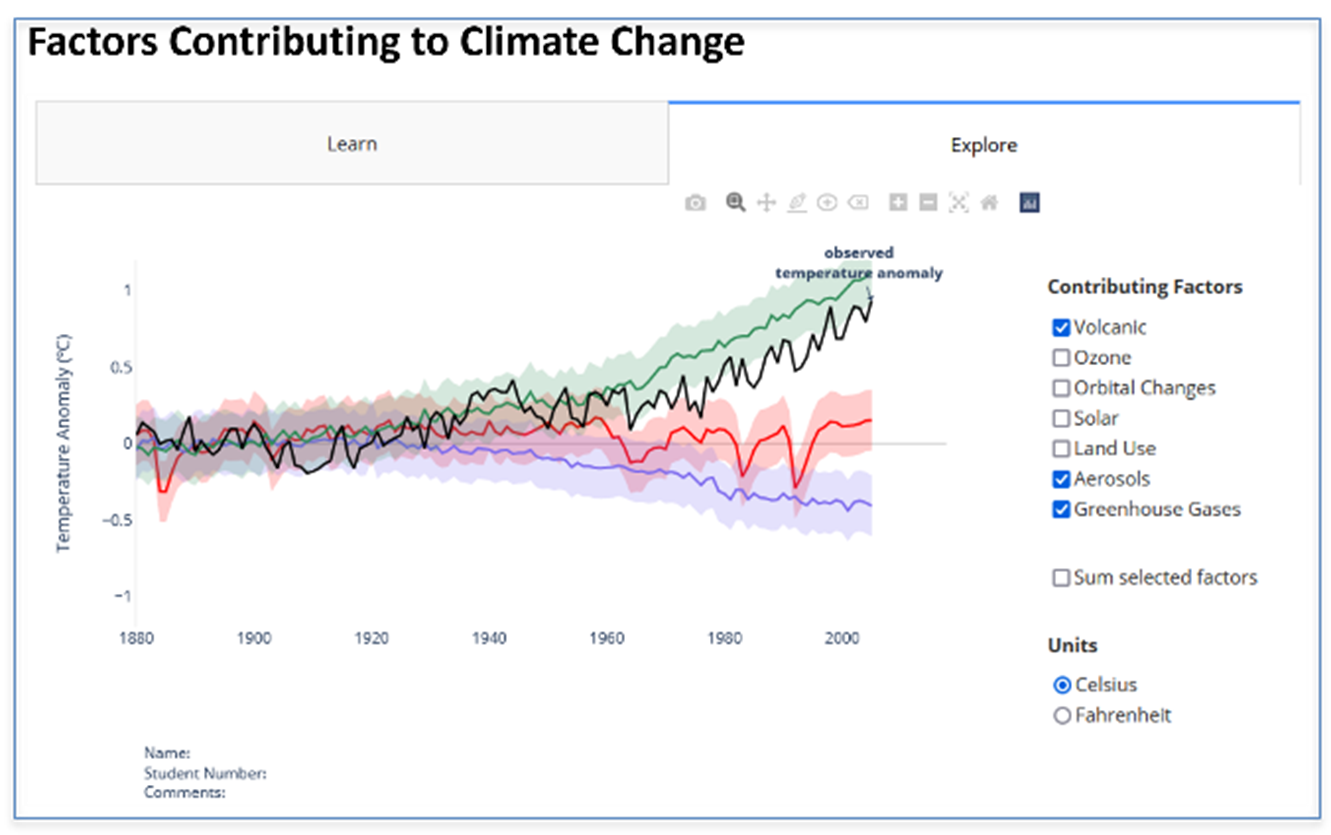
Piloted in EOSC 112, 116, 326, 340, 425. Links at “Global temperature” on our dashboards page.
2. Unconfined-flow: Interactive model of linear (“1D”) groundwater flow in an unconfined acquifer between two sources, with surface recharge included.
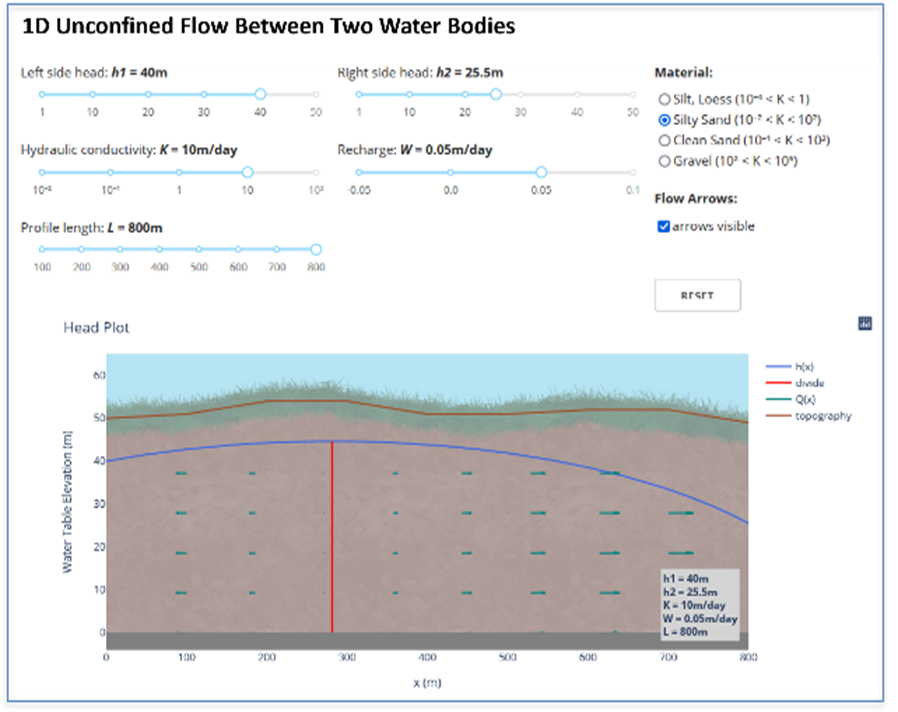
Piloted in EOSC 325. Links at “Unconfined-flow” on our dashboards page.
Two examples for exploring limited but real data sets
1. Oceanography dataviewer: observe and compare trace element and physical properties in the water column at selected locations in the Southern Ocean, the Atlantic and the North Pacific.
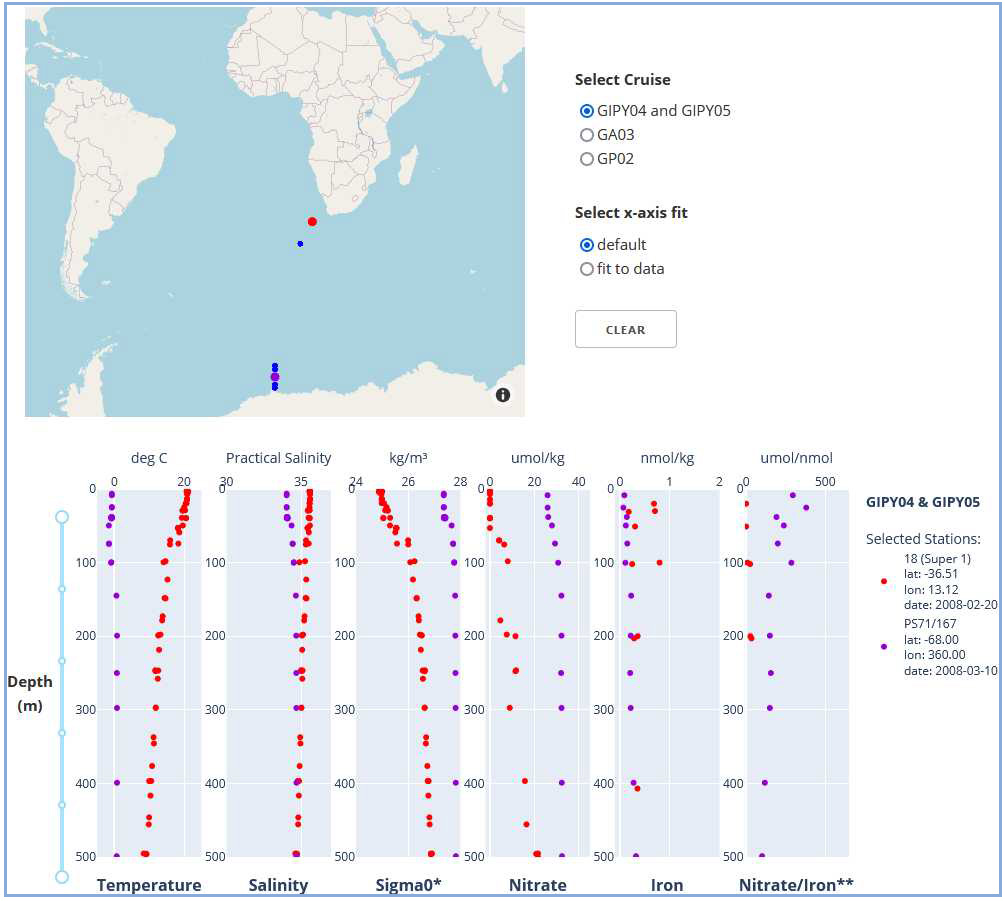
Piloted in EOSC 372. Links at “ocgy-dataviewer” on our dashboards page.
2. CO2 concentrations at Mauna Loa (Hawaii) and the South pole since 1958, including simple linear modeling.
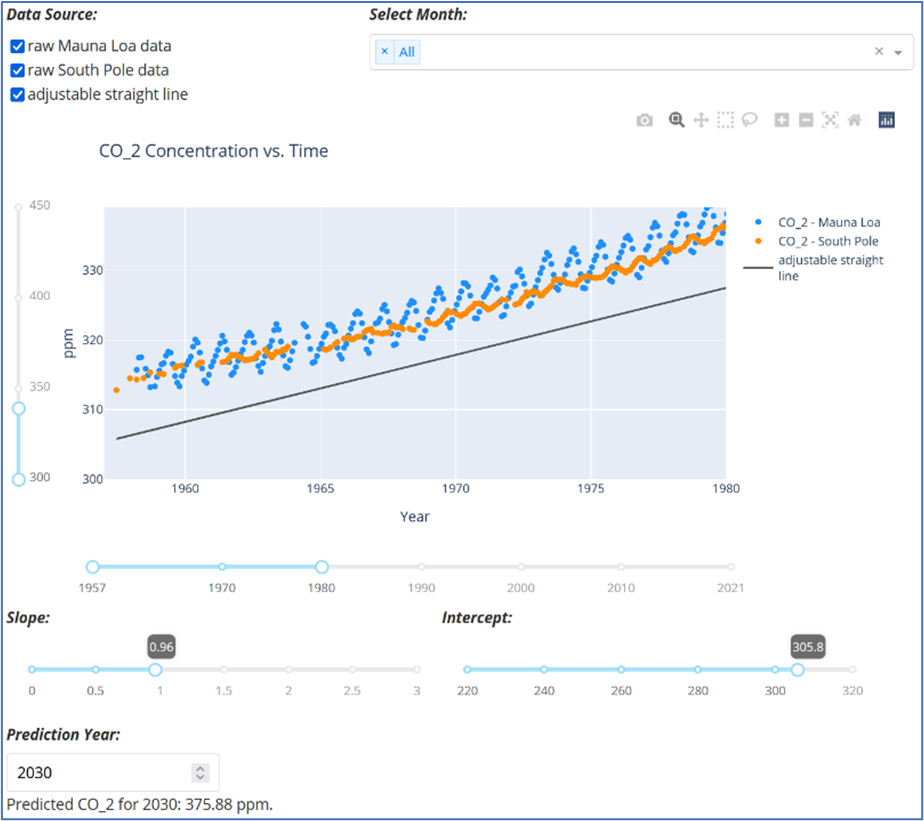
Piloted in ENVR 300. Links at “Atmospheric CO2” on our dashboards page.
Reactions from students and instructors
Student’s reactions via survey questions added to an oceanography course assignment (132 students):
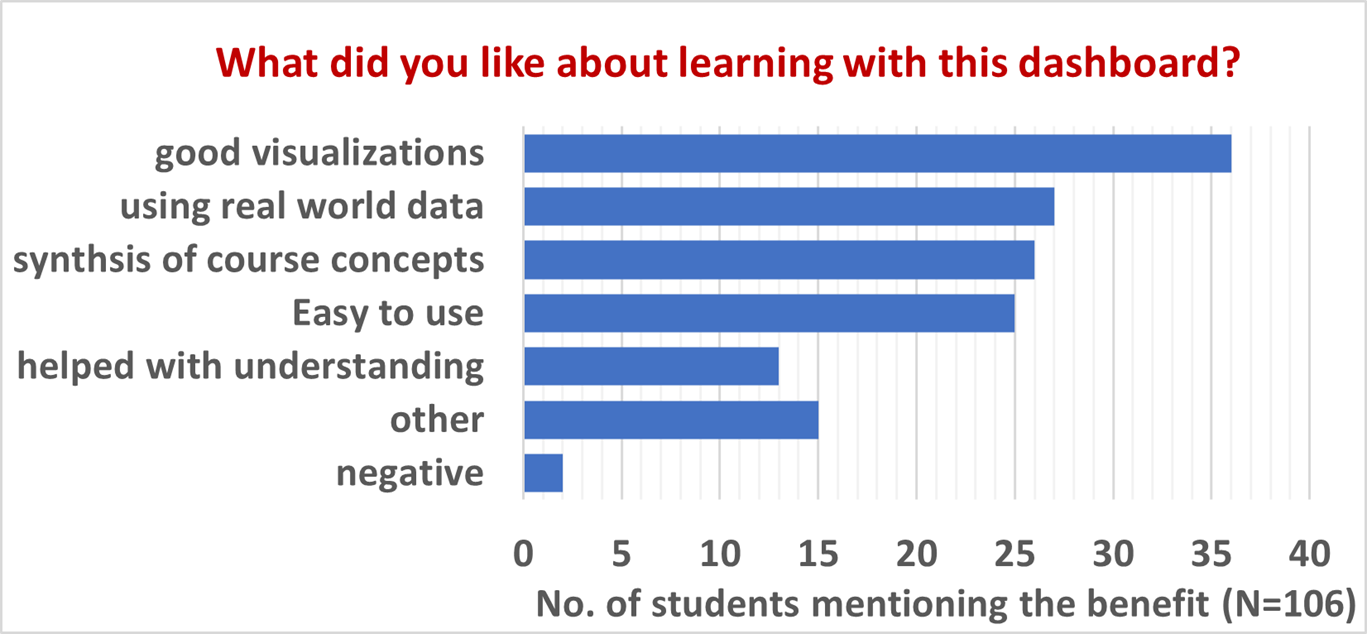
Examples of comments from students:
"I liked how the dashboard exercise applied various concepts using real data from the world's oceans."
"The online dashboard was quite easy to use and interesting as it allowed us to compare different nutrients/properties profiles in different oceans, synthesizing all the concepts in the course."
Instructor’s feedback (during design/build discussions):
"I am so impressed ... I love how (a) sliders constrain and adjust axes, (b) data at various real stations can be chosen on a map and compared, (c) results can be saved to submit for assessment. … thank you to the team!
Work in progress
We are actively searching for new ideas! Please contact one of our principles with ideas or questions (Tara Ivanochko, Phil Austin, Francis Jones, Lindsey Heagy). We'd love to discuss new dashboard ideas, ways of including new or existing dashboards into your lessons & assignments, or creative ways to have dashboards inspire your students and help them learn.
- As of March 2022, the OCESE project has 1 more year of funding. Existing dashboards will be fine-tuned based on experiences in use.
- Costs – i.e. time to develop: It may take anything from a few days (preferred) to extensive effort spanning several terms, depending on the complexity of the app. But an iterative design cycle is important, even with the simplest.
- The design cycle involves concept-design, prototype code, test, develop the learning task (in-class worksheet, take-home assignment, etc.), iterate, implement, gather feedback, improve.
- Theoretical framework: Essentially, “guided inquiry” is a good starting point. There is a fairly extensive literature on use of simulations in learning at all levels – especially from the PhET organization at U. Colorado, Boulder. See references on our project website. The main characteristic of most EOAS dashboards is that the code is kept relatively simple, and scope is tightly focused rather than trying to do too much.
- In EOAS, several third party dashboards are also in use, such as in EOSC 112 (IPCC climate atlas) and EOSC 340 (greenhouse PhET). See our list for some selected examples. Contact OCESE project principles for help with finding and implementing these types of 3rd party interactive learning resources.
- OCESE project documentation (in progress) includes the growing list of apps, and pages with dashboard development guidelines, ways of deploying dashboards locally or online, and some guidelines for teaching with dashboards.
Dashboard development credits
- EOAS student contributors: A. Loeppky, J. Byer, F. Rossmann, Y. Egorovo, Y. Kuzmenko.
- EOAS faculty contributors: Austin, Ivanochko, Jones, Heagy, Maldonado, Orians, Waterman, Sutherland, Orsi, Radic, Hodge, Ameli, Hickey.
- See also our complete list of all student and faculty contributors.
To learn more, and especially if you have an idea for an app that will inspire students and help them learn in EOAS courses, please contact any of the team members listed on the contributors page.
For more EOAS news items, please use the "search" and "filter" options at the top of our news and events page.
Meet Cara James - Geophysicist
Cara James is a new Geophysics PhD student within the EOAS department at UBC, investigating the fluid dynamics of particle clouds produced during deep-sea mining and modelling how they may impact ocean health. Cara moved to Vancouver in January 2022, having completed her undergraduate degree in Natural Sciences and masters in Earth Sciences in the UK.
Associate Professor Stephanie Waterman Awarded Charles A. McDowell Award
The Department is pleased to announce that Dr. Stephanie Waterman has won the Charles A. McDowell Award. This award, consisting of a medal and a certificate, is presented to an outstanding young faculty member who has demonstrated excellence in pure or applied scientific research.
Stephanie is a sea-going physical oceanographer interested in the fundamental role that ocean mixing processes play in climate dynamics, and how these mechanisms control the distribution of heat, energy, chemicals and marine organisms globally.
She approaches her research both through observational and theoretical perspectives, using targeted field observations, observational data analysis, idealized process modeling, analytical analysis and lab studies. Her main aim is to observe real-world systems, identify the important physical processes generating individual phenomena, and reduce their complexity to a useable and useful model. Read more about her research here.
Congratulations to Dr. Waterman!
For more EOAS news items, please use the "search" and "filter" options at the top of our news and events page.
